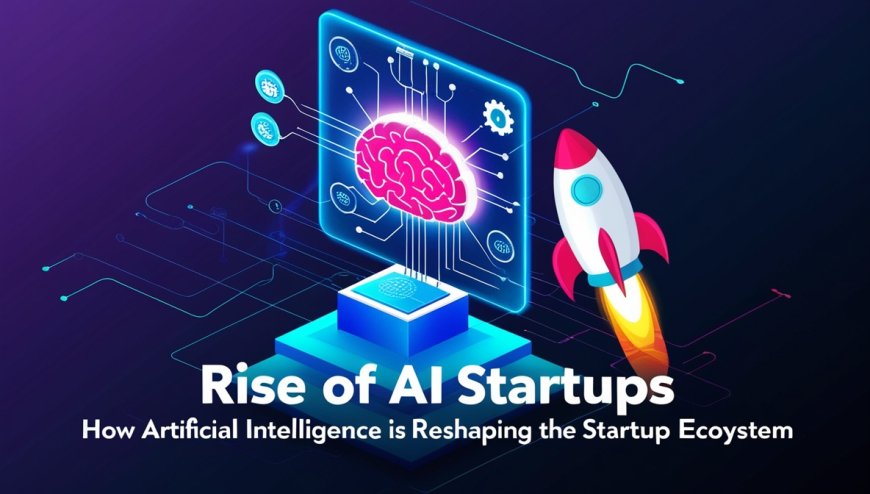The Rise of AI Startups: How Artificial Intelligence Is Reshaping the Startup Ecosystem
Explore how AI startups are changing industries from healthcare to finance. Learn why investors are betting big on artificial intelligence and what the future holds for AI-driven innovation.

Today's startup scene is more dynamic than ever before, and artificial intelligence (AI) is at the center of this development. What was once a catchphrase is now the driving force behind some of the most innovative startups in every sector, including marketing, e-commerce, cybersecurity, healthcare, and finance. AI is now the cornerstone of contemporary innovation rather than merely a tool.
AI startups are developing faster workflows, more intelligent systems, and previously unheard-of user personalization. The possibilities are endless and expanding every day, ranging from AI-powered chatbots that respond to thousands of consumer inquiries to predictive algorithms that predict stock market movements.
We examine how AI startups are growing, what drives their success, and why investors are placing large bets on this technological revolution in this blog.
1. Why AI Is a Goldmine for Startups
Startups, in contrast to established companies, are driven by lean innovation, speed, and scalabilityelements that AI technology perfectly complements.
Heres why AI fits the startup model so well:
-
Data-Driven Decisions: Startups can collect and analyze vast data in real time to improve offerings instantly.
-
Automation: Reduces manpower needs, allowing startups to scale faster with smaller teams.
-
Customization: AI enables hyper-personalized user experiences, boosting customer retention.
-
Predictive Insights: From product development to customer behavior, AI predicts outcomes before they happen.
AI gives small startups the power to compete with tech giants by leveling the playing field through smart automation and advanced analytics.
2. Sectors Where AI Startups Are Booming
AI is no longer limited to tech labs. Here are some industries being transformed by AI startups in 2025:
Healthcare
-
AI diagnostics and virtual health assistants
-
Predictive health analytics
-
Personalized treatment plans based on genetic data
Finance
-
AI-powered robo-advisors for personal finance
-
Fraud detection and risk analysis systems
-
Smart trading algorithms for investment
E-Commerce
-
Visual search engines and AI product recommenders
-
Dynamic pricing tools
-
AI-powered chatbots for 24/7 customer service
Marketing
-
Predictive campaign planning
-
Automated content generation (like ChatGPT ?)
-
AI-driven analytics for real-time insights
Cybersecurity
-
AI systems that detect threats before they escalate
-
Behavior-based fraud detection
-
Automated incident response
Startups working in these spaces are attracting not just usersbut massive funding rounds from top VC firms.
3. Funding Surge for AI Startups
The hype and the outcomes are being followed by money. Crunchbase and CB Insights report that in the last 12 months alone, AI startups have raised more than $60 billion in venture capital worldwide. As the need for AI solutions rises, that figure is anticipated to rise even further.
Why investors love AI startups:
-
Scalability: One algorithm can serve millions without added cost.
-
High retention: AI products often become irreplaceable once integrated.
-
Cross-industry relevance: AI can be applied across multiple sectors.
-
Innovation edge: Investors know AI is the futureand the future is profitable.
Major companies like Google, Microsoft, and Amazon are also acquiring promising AI startups, creating huge exit opportunities for founders.
4. Challenges AI Startups Face
Of course, its not all smooth sailing. AI startups, especially in the early stages, face unique challenges:
Data Dependency
AI needs high-quality data, and collecting or buying it isnt cheapespecially for niche industries.
Talent Shortage
AI engineers and data scientists are in high demand, making it hard for startups to recruit top talent without big salaries.
Ethical Dilemmas
Bias in AI algorithms, privacy concerns, and transparency issues can all create PR and legal nightmares.
Infrastructure Costs
Training models like GPT or DALLE requires significant computational power and cloud infrastructure.
Still, the startups that overcome these hurdles often end up leading their industriesand reshaping them in the process.
5. Top AI Startups to Watch in 2025
Here are a few trailblazing AI startups making waves this year:
1. OpenAI
Famous for ChatGPT, OpenAI continues to lead in conversational AI, with applications in education, customer service, and creative industries.
2. Runway
An AI video and media editing startup that's helping creators produce professional content using generative AI.
3. Hippocratic AI
Focused on using AI for healthcare workflows, aiming to improve patient care through virtual assistants.
4. Cohere
Building language models specifically tailored for business use cases and helping companies build their own AI tools.
5. Adept
Working on human-computer collaboration through action-based AI agents that can use software like a human assistant.
Each of these startups showcases how diverse, disruptive, and powerful AI innovation can be.
6. The Future of AI Startups: Whats Next?
Looking ahead, AI startups will continue to influence both the way we live and the way we work. Here's what to expect:
-
AI-as-a-Service: More startups will offer pre-trained models to companies without in-house AI teams.
-
Edge AI: Processing data locally instead of in the cloudideal for smart devices and IoT.
-
Ethical AI Startups: Companies focused on building bias-free, transparent, and regulation-compliant AI models.
-
Collaborative AI: Startups building AI tools that work with humans rather than replace them.
The age of AI startups is not just about robots taking over; its about amplifying human potential and creating new opportunities.
Conclusion
The future is being coded right now, and it's powered by AI. If you're planning to launch an AI startup, the time is now. If you're just an interested observer, buckle upthe next decade of innovation is going to be breathtaking. AI startups are the essence of the modern tech ecosystem because they are small, fast, and fearlessexactly what the world needs to solve big problems with clever solutions.











































